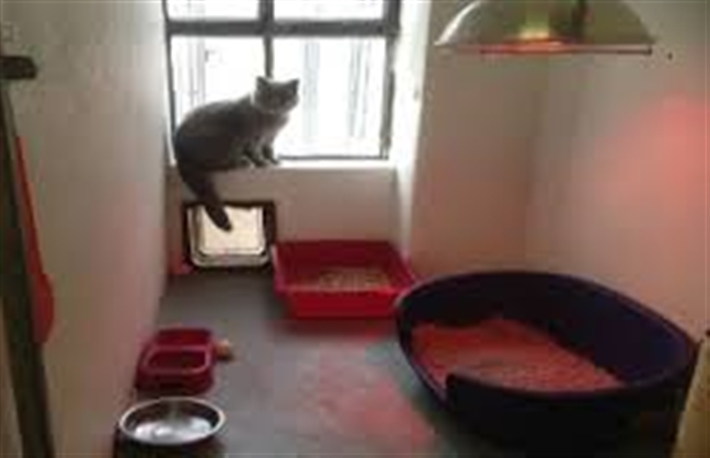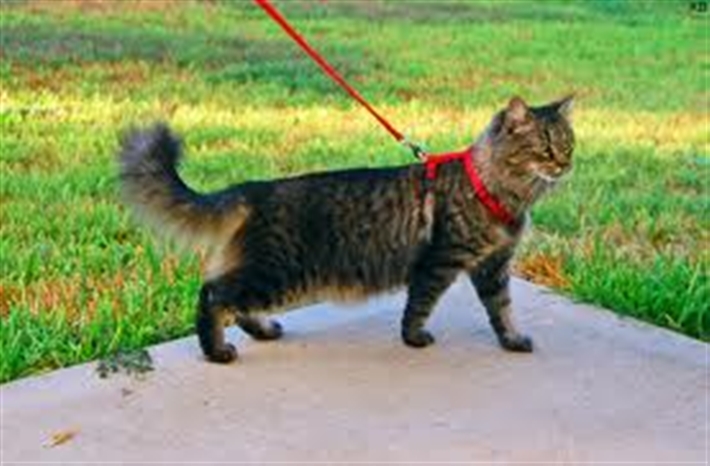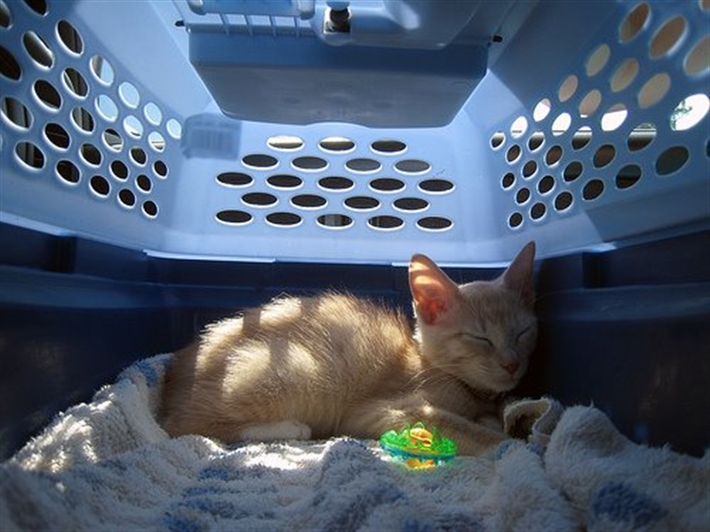Cattery,Cat Sitter or Travelling Cat?
Take Along or Home Alone?
Going on holiday? Business Trip? Extended hospital Stay? What about the cat?
Read our handy guide for tips on choosing which solution is best for your cat. The choice depends on your own cat's personality, and your circumstances, but leaving it till the last minute is guaranteed to lead to panic and a poor experience for you and your cat.
Cat Sitter | Cattery | Fosterage | Travelling Cats | Home Alone
Cat Sitter
 For most cats, this is the best solution. A friend, neighbour or relative that you and your cat know, and who can be trusted to come in at least twice a day to feed and service your cat, and who you know is cat-savvy enough to spot problems enables your cat to stay where he will be happiest and most confident - in his own home. Losing his primary care-giver, especially if this is the first time it has happened, and particularly for a rehomed cat that may already have experienced abandonment can be traumatic for a cat. He cannot read the calendar and has no idea if, let alone when, you will return. Keeping his territory and having a friendly and familiar hand stroking and feeding him, and keeping his litter tray clean, is the best solution for most cats. The best candidate is someone who has, or has had their own cat, and whose cat-keeping standards are similar to your own.
For most cats, this is the best solution. A friend, neighbour or relative that you and your cat know, and who can be trusted to come in at least twice a day to feed and service your cat, and who you know is cat-savvy enough to spot problems enables your cat to stay where he will be happiest and most confident - in his own home. Losing his primary care-giver, especially if this is the first time it has happened, and particularly for a rehomed cat that may already have experienced abandonment can be traumatic for a cat. He cannot read the calendar and has no idea if, let alone when, you will return. Keeping his territory and having a friendly and familiar hand stroking and feeding him, and keeping his litter tray clean, is the best solution for most cats. The best candidate is someone who has, or has had their own cat, and whose cat-keeping standards are similar to your own.
Before you leave, make sure you
- leave a contact number for you e.g. a mobile, for emergencies (and those important texts reassuring you that your special cat is fine)
- leave the contact number for your vet
- tell your vet that the carer will be acting on your behalf during the period
- if your cat is on medication, that the carer is confident to give the medication, and there is enough to cover the period; put the medication in a labelled box with the dosage etc written clearly on top
- make sure there is enough food to cover the period plus a bit extra
- Make sure there is enough cat litter to clean the box on your preferred schedule for the whole period
Cattery
 Sometimes it may not be possible for your cat to stay at home. In this case you need to start looking for a good cattery in plenty of time. There are a lot of good catteries around ... but some that are not so good.
Sometimes it may not be possible for your cat to stay at home. In this case you need to start looking for a good cattery in plenty of time. There are a lot of good catteries around ... but some that are not so good.
Personal recommendation is the best guide to the real cattery experience. Your vet should also have a good idea of which local catteries they trust. A good cattery, with professional, caring and responsible staff, good care protocols and emergency planning, is the next best solution if your cat really cannot remain in your home with a sitter.
Firstly, think about your cat. What does he particularly value? A high perch? Hiding places? Lots of human interaction? TV? Is he outgoing and confident or shy? Does he lash out aggressively if he is scared? is he on medication? Does he have a sensitive stomach or will he eat anything? Is he fussy about his cat litter?
Visit the proposed cattery several times, and ask lots of questions about daily routine, and also what happens in the event of problems. Don't accept glib "standard" answers - pose some hypothetical situations (eg my cat won't eat, or my cat vomits, or my cat hides in its box and doesn't come out) and listen to the response - and the manner of the person telling you. If it is a large cattery, the actual cat care might be done by someone other than the owner, or the receptionist, in which case ask to speak to the cat carers. Ignore the reception area and look at the cat pens - are they clean? Do they look comfortable from a cat's point of view? What kind of barriers are there between adjacent pens - cats do not derive comfort from the presence of other cats, and in fact, often find it stressful. In some catteries, you can pay extra for "luxuries" - you will have to decide if they are features you cat needs.
Make sure they understand any medication needs and agree in writing to provide the medication. Likewise, have in the agreement what kind of food your cat will be given, and which vet will be used in the event of an emergency. Most catteries are responsible and caring, but they are businesses, and so, just as if you were sending your child to a holiday camp, you need to have the same level of information and signed agreements.
Fosterage
You might think it is a good idea to have your cat stay with a friend or relative while you are away. Although this is much cheaper than a cattery, unless they are very experienced cat keepers, this is not a very good solution. For one thing, it puts a huge responsiblity on the person looking after your cat, without the insurance or professional support that a cattery has. For another, they will have to disrupt their own lives hugely and this is a much bigger sacrifice than visiting your cat at home. If they have their own cat or cats, they will HAVE to be kept separate, but all cats will know the others are there and will therefore be stressed. For short periods (a few days) it might be possible, but is really not recommended for longer periods.
A variation is to ask if a cat welfare organisation such as CP could foster your cat, but this is only likely to be possible in extreme circumstances.
Travelling Cats
 Some exceptional cats enjoy travelling with you! These tend to be either very outgoing, curious and intelligent cats, or remarkably laid-back and easy-going cats - most cats would simply find it too stressful. If you think your cat could be a travelling cat, and if that is possible for your destination, then you might decide to take your cat with you.
Some exceptional cats enjoy travelling with you! These tend to be either very outgoing, curious and intelligent cats, or remarkably laid-back and easy-going cats - most cats would simply find it too stressful. If you think your cat could be a travelling cat, and if that is possible for your destination, then you might decide to take your cat with you.
Firstly, make sure your pet will be welcome on arrival! And that the place you are staying will be cat-friendly - you do not want your cat to be able to escape and perhaps get lost, or fall victim to unfamiliar roads, predators, parasites etc. If you are going abroad, this is particularly important. Will you be able to buy food and litter, or will you need to take it with you? What about veterinary care in the event of an emergency? Are there any legal controls on cats at your destination?
If you are going outside the UK, you will need a pet passport, to avoid costly and stressful six-month quarantine when you come back. You need to start well in advance to qualify your cat for a passport.
How will your cat travel? What kind of carrier? How will you feed/water your cat and let him use his litter tray? If you are travelling by air you need to be very, very clear whether you cat will be travelling in the cabin (you may have to buy him a seat), or be in the hold? If in the hold, you need to make sure at the airport that the hold on your flight is pressurized, and that the flight attendants know a live animal is travelling.
 You will need a solid carrier, big enough for your pet to stand, lie, sit up and turn round in. Get your cat used to playing in and around the carrier well ahead of time - toss a toy in, spray it with catnip if your cat is catnip-sensitive, and get your cat used to riding in the carrier around the house and garden, and then back into their home environment, so they don't just associate it with going to the vet. Put their faviourite blanket or toy inside.
You will need a solid carrier, big enough for your pet to stand, lie, sit up and turn round in. Get your cat used to playing in and around the carrier well ahead of time - toss a toy in, spray it with catnip if your cat is catnip-sensitive, and get your cat used to riding in the carrier around the house and garden, and then back into their home environment, so they don't just associate it with going to the vet. Put their faviourite blanket or toy inside.
Don't feed your cat just before starting off or they may be sick - feed them well in advance, and plan feeding stops if the trip is more than an hour or so. Make sure the carrier is well ventilated, and if travelling by car, don't make the car too hot, avoid sudden braking, and loud noises and keep a supply of fresh air by having the blower on. As well as food, make sure they have water too. Some regular traveller cats get the hang of drinking from a feeder bottle from inside the carrier - if yours can do that, use a plastic tube bottle rather than metal as it is safer.
You may be wondering about sedation for your cat during travel. If you feel the need for sedation, that would indicate that travel for your cat is not something to do lightly. Unless you are going to be able to monitor your cat continuously throughout the journey, sedation has its dangers - on air flights particularly, sedated pets have died because the sedation sent them into hypothermia, and flight attendants cannot enter the hold to check your pet. Your pet will probably be better off on balance without sedation. However, remember that aircraft holds, even pressurized ones, are cold, and you need to make sure your pet will be warm enough - while also making sure that he does not overheat on arrival and when awaiting customs clearance and collection.
If your cat is a travelling cat, you may like to harness-train him. This will make all aspects of travel much easier - if you can let him have some exercise on his harness during the journey, particularly if you are travelling by car, it will make things much easier.
Overall, this is a real case for being led by your cat's character. I know one travelling cat who regularly goes by car and Eurostar to Germany and enjoys every minute, whereas my own cat would hate the whole experience. So unless you are relocating, let your cat be your guide.
Home Alone
 No!!! Don't do it! Do not EVER leave your cat at home during your holiday with "plenty of food and water".
No!!! Don't do it! Do not EVER leave your cat at home during your holiday with "plenty of food and water".
Suppose your cat gets sick? No one will know. Suppose your cat kicks over the water bowl on day 2 and has no more water for the rest of the period? Suppose there was a house fire? Suppose a burgler got in and your cat escaped? Not to mention the amount of damage a bored cat could do left unattended for two weeks.
Owners have done this and come home to dead cats. Or very sick ones that had to be rushed to the vet and run up a huge bill to save its live.
Your cat should never a solution for more than 24 hours, 36 at the outside.
If you can't make proper arrangements for your cat while you are away .... should you actually have a cat?